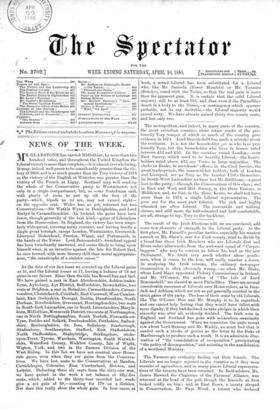The result of the Irish Elections will, we are convinced,
add sonic new elements of strength to the Liberal party. In the first place, Mr. Parnell's peculiar tactics, especially his wanton assault on Mr. Shaw's seat for Cork county, tend to divide by a broad line those Irish Members who are Liberals first and Home-rulers afterwards, from the awkward squad of " Carpet- baggers " who may be content to follow his lead in the new Parliament. We doubt very much whether these gentle- men, when it comes to the test, will really number a dozen. In analysing the Irish returns, the ordinary newspaper enumeration is often obviously wrong,—as when Mr. Blake, whom Lord Mayo appointed Fishery Commissioner in Ireland, and Mr. O'Connor, the author of "The Life of Lord Beaconsfield," are classed as mere Parnellites. There are several considerable successes of Liberals over Home-rulers, as in Dun- dalk and Athlone, which are not as yet generally counted in the strict gains of the party. The loss of their seats by old Liberals like The O'Conor Don and Mr. Murphy is to be regretted, and one cannot help feeling that they would have fallen with more dignity, if they had declined to take pledges in which their sincerity was, after all, evidently doubted. The Irish vote in England and Scotland has gone with miraculous unanimity against the Government. When we remember the quite recent row about Lord Ramsay and Mr. Waddy, we must feel that it needed such a stroke of genius as the letter to the Duke of Marlborough to produce such a result. It is an admirable illus- tration of "the consolidation of co-operation" precipitating "the policy of decomposition," and assisting in the annihilation of a moribund Ministry.


































